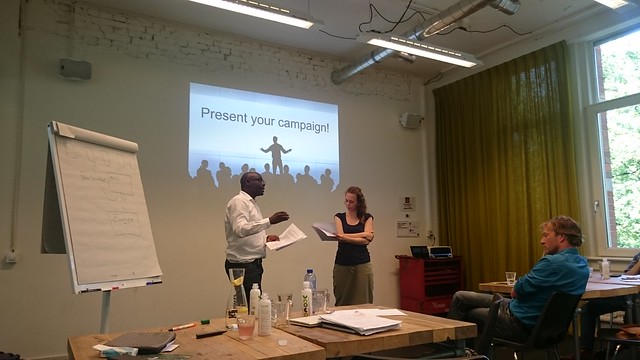SPARK learns about crowdfunding
On Saturday the fourth of June SPARK and the CrowdfundingHub Amsterdam organized a workshop on crowdfunding and the possibilities it could provide for entrepreneurs. For everyone who missed it here are the most important take-away points of the day.
What is crowdfunding?
Crowdfunding is the practice of raising funding for a project or event by raising contributions from a large number of people, usually online.
There are 4 different types of crowdfunding:
- Donation based; people are asked to support a project without receiving anything in return, in order to be successful people will have to feel connected to you or your project
- Reward based; this is the most common type of crowdfunding, different types of rewards (products & discounts) are offered to people who support the project. These rewards can be financial or material but also emotional for example a meet & greet in the case of an aspiring artist
- Lending; the contribution to the project is made in the form of a loan, supporters usually also receive interest on their original contribution. This type of loan is usually faster and more transparent than a bank loan, however not necessarily cheaper as interest rates depend on the agreement between the supporter and the fundraiser
- Equity; the supporter will also receive interest or stock(s) in the product or service they’ve invested in.
Crowdfunding is about more than money!
Community is central to a successful crowdfunding campaign, people need to be involved and need to care about the product or service they invest in. When they feel connected they will help promote and market the product. Additionally a crowdfunding campaign can be a useful tool to research the amount of people that would be interested in your product. Because of these additional aspects a crowdfunding campaign can add more to your business or product than just raising funds.
Crowdfunding can be a very consuming activity which requires full commitment I order to be successful. Keep your campaign short, between 4-6 weeks in order to make it manageable but also because a tight deadline also gives a little urgency to your campaign. Remember the actual campaign can take much longer than 4-6 weeks. Try to create a supporting community who pledge to your cause before you start your live campaign, this will also prevent your campaign from stalling at a low level of supporters. Remember that with many crowdfunding platforms if you don’t reach your target, you have to pay back the amount you have already raised. Also use the campaign as an opportunity to grow your network. If you have a large social network your campaign is much more likely to succeed, especially since in general about 30% of your supporters will be people from your closest networks. It is worth seeing the crowdfunding tool as only one part of a larger campaign. Place it carefully and it can be very helpful.
Platforms
There are a lot crowdfunding platforms where you can set up your campaign, most of these platforms can also help you manage your campaign for a success fee (this is usually between 5-10% of the entire amount raised, you only have to pay this fee if your campaign is successful). A few examples of well-known platforms are: Kickstarter, crowdaboutnow, voordekunst, oneworldcrowd. Due to the large amount of platforms it might be difficult to find the right one for your campaign, therefore several ‘roadmaps’ and articles explaining the differences between platforms can also be found online.

